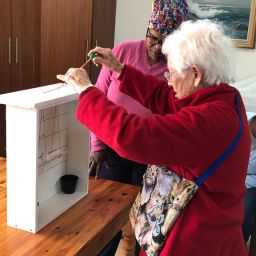MEMORY LOSS, DEMENTIA, ALZHEIMER’S DISEASE. WHILE THEY’RE ALL ASSOCIATED, THE LINK BETWEEN THEM IS OFTEN MISUNDERSTOOD. WE SEPARATE THE FACTS FROM THE FICTION.
By Gillian Klawansky
Article kindly supplied by Dis-Chem Benefits magazine.
Forgetting the names of people or places. Struggling to remember where you left your wallet. Missing an appointment. While some memory loss in the form of these examples is a common consequence of ageing, Alzheimer’s is not. Although your risk of developing some form of dementia, including Alzheimer’s, increases as you age, it is not an inevitability. The risk of developing the disease does however increase the older you get.
According to the US National Institute on Aging (NIA), the number of people with Alzheimer’s disease doubles about every five years after they reach the age of 65. About one-third of all people aged 85 and older may have Alzheimer’s disease.
DEFINING DEMENTIA
In understanding the difference between memory loss, dementia and Alzheimer’s disease, it’s best to start with dementia. “Dementia is loosely defined as cognitive impairment which includes memory loss, loss of executive functioning, behavioural changes and loss of words,” explains Dr Carmella Mielke, a general practitioner with a special interest in geriatrics based at Elphin Lodge retirement village in Rietfontein.
Dementia itself is not a disease, rather it is a big umbrella term for a collection of symptoms that result from damage to or changes in the brain caused by various diseases. “The most common cause of dementia is Alzheimer’s disease,” explains Dr Mielke. Yet it is not the only cause. Others include:
brain injury
- vascular dementia – caused by any vascular diseases such as long-term hypertension, uncontrolled cholesterol or diabetes and a series of small strokes
- frontotemporal dementia – a group of brain disorders that mainly affect the frontal and temporal lobes of the brain
- Parkinson’s disease, Lewy body dementia, HIV and epilepsy
Often starting out with fairly mild cognitive impairment where people slowly battle to function normally, dementia is progressive, meaning it steadily becomes more severe to the point where the patient is completely dependent on others 24/7 as they are unaware of their surroundings and unable to conduct conversations.
UNDERSTANDING ALZHEIMER’S
Slowing destroying memory and thinking skills and eventually the ability to carry out simple tasks, Alzheimer’s is a brain disorder thought to be caused by the accumulation of proteins in and around brain cells. Changes in the brain are also characterised by the loss of neurons – the nerve cells that send and receive signals from the brain – and the connections between them.
While it’s primarily associated with people over the age of 65, a far smaller proportion of the population, between 30 and 60, are diagnosed with rare early-onset Alzheimer’s.
While people can live for many years with Alzheimer’s, in advanced stages, complications arising from severe loss of brain function – such as dehydration, malnutrition or infection – can become life threatening.
DIAGNOSING DEMENTIA
Diagnosing Alzheimer’s or any form of dementia is a multifaceted process that starts with getting an extensive medical history of the patient. “It also includes cognitive assessments by a general practitioner or specialist such as a geriatrician, neurologist or psychiatrist,” explains Dr Mielke. “A blood work-up is crucial to exclude underlying medical conditions such as vitamin B12 deficiency, under- or overactive thyroid and underlying vascular diseases such as diabetes and high cholesterol.
Then doctors need to get a clear picture of the brain. “Brain imaging is also important such as an MRI or CT brain scan. This will exclude masses in the brain and pick up mini strokes or frontotemporal dementia as well as normal age-related changes such as atrophy of the brain – shrinkage of the brain.”
SLOWING DOWN PROGRESSION
While dementia has no cure, deterioration can be slowed down. “In terms of treatment there is no magic bullet,” says Dr Mielke. “However, treatment has to be holistic. For Alzheimer’s there are a few prescribed medications that slow down the progression of memory loss. While these medications do not restore memory, they halt the progression. The latter medication also has side effects so need to be started and monitored closely.”
Although these medications do not treat other causes of dementia such as vascular or frontotemporal dementia, there are other options. Alternative treatments include:
- managing precipitating factors such as poorly controlled hypertension, cholesterol and diabetes
- correcting underlying deficiencies such as vitamin B12 and thyroid
- controlling underlying depression and anxiety which often makes the memory worse
Managing dementia also comes with providing the right support as well as finding means of mental stimulation. “Non-medical interventions that are just as crucial as medication include establishing a daily routine, adequate caregiver support for the patient as well as for the primary caregiver, and doing activities to stimulate the brain,” explains Dr Mielke. “These include puzzles, painting, reading and doing anything that gets the brain nerves firing.”
No matter how well-intentioned caregivers may be, they need to be mindful of the dementia patient’s limitations. “Change of routine can evoke anxiety and escalate worsening cognitive impairment,” cautions Dr Mielke. “A perfect example is booking a holiday which, in theory, sounds good. However, the stress and change of environment can really throw the person with dementia off course.”
CARING FOR CAREGIVERS
Caring for a loved one who is slowly beginning to forget who you, or even who they themselves are, can be devastating. “Emotional support is so important for the family and primary caregiver whether that is the spouse, partner or child,” says Dr Mielke. “There are support groups like Alzheimer’s South Africa, which help families understand how to deal with a loved one who has dementia.”
Knowing the right things to say can also be a minefield when your loved one becomes increasingly confused. “It’s about small things, such as not arguing if the person with dementia says the sky is pink,” she continues. “One does not contradict but rather say ‘wow you’re right the sky is pink and beautiful’. It’s having to make difficult decisions such as no longer allowing the patient to drive and taking away their credit cards.”
Sometimes the responsibility and emotional toll the disease takes becomes too much to handle. “There is something called caregivers’ burnout where the primary caregiver literally burns out from looking after a loved one. In this instance, organising an external caregiver or considering a care home should be considered.”
DEMENTIA DOES NOT DISCRIMINATE
Dementia can affect anyone. “I have patients who were CEOs of big companies, professors, doctors and teachers and some with no formal education,” says Dr Mielke. “We don’t fully understand why some people get dementia and others don’t.” Yet, doctors advise everyone to be proactive by keeping one’s mind healthy and active especially as old age approaches. “This also includes controlling hypertension, cholesterol and diabetes,” says Dr Mielke. “Eating healthy and exercising is vital. Keeping the brain active by working or having a hobby and being social is also strongly recommended.”
WHEN TO SEE THE DOCTOR
Before jumping to conclusions, it’s best to differentiate between memory loss that comes with the normal progression of ageing and that which signals something more serious. Occasional lapses in short-term memory come with ageing and are generally not cause for concern if they do not disrupt one’s ability to function. Examples include when an older person sometimes forgets why they walked into a room, forgets one appointment, or mistakenly calls their grandson by their son’s name. “As soon as the memory loss starts to impact on a person’s life and affects what is termed ‘activities of daily living’, then it needs to be investigated further,” says Dr Mielke.
Frequent signs of cognitive decline that are worrying you or a family member suggest it may be time to visit the doctor. Ignoring the symptoms, or attributing them to a normal part of ageing, can delay necessary treatment so if you’re in doubt, rather book an appointment.
Examples include:
• Getting lost • Inability to do one’s finances,
• Misplacing important items
• Behavioural changes such as aggression, agitation, irritability and depression
Additional sources: https://alzheimers.org.za/what-is-alzheimers / https://www.nia.nih.gov/health/what-causes-alzheimers-disease / https://www.nia.nih.gov/health/memory-forgetfulness-and-aging-whats-normal-and-whats-not / https://www.mayoclinic.org/diseases-conditions/alzheimers-disease/symptoms-causes/syc-20350447
















